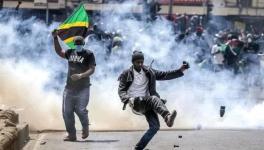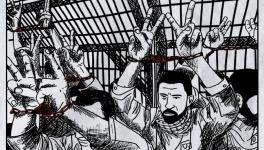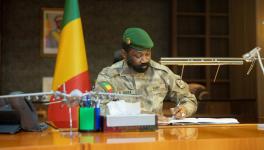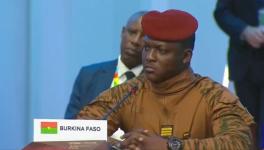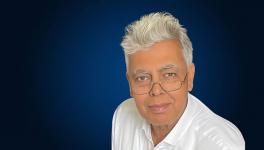Being LGBTQ in Africa Still Draws Stigma, Violence and Criminal Charges
A participant at a protest by the LGBTQ community in Kenya
The persecution of LGBTQ people by the state is brutal in Africa. In some countries, sexual minorities fear for their lives due to the threat of the death penalty or lengthy prison sentences.
There are also drastic restrictions on LGBTQ freedom of expression, as well as discrimination.
That was evident on a football field in France recently.
In mid-May, Senegalese international and Paris Saint-Germain soccer club player Idrissa Gana Gueye refused to wear a rainbow jersey as a symbol of greater tolerance and support for lesbian, gay, bisexual, transgender, queer or questioning, also known as LGBTQ, and people with other sexual minorities.
The rhetoric against LGBTQ people has increased among Senegalese social media users since the incident at a league match in France.
In France, Gueye was criticized but in Senegal the player has received much support for his behavior, even at the highest level.
" I support Idrissa Gueye," Senegal's President Macky Sall tweeted. "His religious beliefs must be respected."
Around 95% of Senegal's population is Muslim and so-called "unnatural acts" with a person of the same sex are punishable by law with prison terms of one to five years.
Increase in attacks
Members of the LGBTQ community report that attacks and homophobic incidents in the West African country have increased in recent years.
![]()
Meanwhile, violence against LGBTQ people in Cameroon is also on the rise, according Human Rights Watch.
The country still criminalizes same-sex relationships, according to Lewis Mudge, the organization's director for Central Africa.
"This law creates this atmosphere in which LGBTQ people are targets," Mudge told DW.
"Homosexuality, same-sex conduct, is difficult for some people in Cameroon to accept, as it is in other African countries," he said.
The police are also not on their side, he added.
Where in Africa do LGBTQ people have rights?
In the past decade, five African countries have legalized homosexuality. Angola now allows same-sex relationships after passing a new law that came into force in February 2021.
The new law overturned legislation that dated back to 1965, when the country was still under British rule.
In 2015, Mozambique removed a colonial era clause from its penal code that banned same-sex relationships. It had designated them a "vice against nature."
Lesotho and Seychelles are also among the frontrunners in terms of acceptance, according to a 2020 global overview by the International Lesbian, Gay, Bisexual, Trans and Intersex Association.
Uganda held its first LGBTQ pride march in 2012
Same-sex partnerships are only legal in 22 of Africa's 54 countries, according to the overview.
In some countries, they are punished with imprisonment, in others even with death — that includes Mauritania, a dozen states in Nigeria and Somalia where Sharia law applies.
The maximum sentence is life imprisonment in Tanzania, Uganda and Zambia, while in Gambia, Kenya and Malawi, prison sentences of up to 14 years are possible, according to the overview.
In Zambia, President Hakainde Hichilema has just reaffirmed at a church service that his government would not stand up for the rights of homosexuals in the country.
Kenya is often a destination for LGBTQ people fleeing other parts of Africa
While same-sex relationships are not criminalized in Rwanda, members of the LGBTQ community criticize the government for not protecting them enough from stigma and violence by security agencies.
This is confirmed by the Kigali-based Health Development Initiative.
Fighting discrimination and stigmatization
The initiative's director, Aflodis Kagaba, commissioned a study on the challenges facing the LGBTQ community in Rwanda.
"Leaving no one behind means addressing stigma and discrimination," Kagaba told DW.
"We must ensure that all those inequities that make some of us feel unwelcome or condemned in our society are eliminated."
Institutions that support women should also consider LBGTQ people, one Rwandan activist told DW.
"We want to see ways they can improve their social or economic status, in the private or public sphere, without paying attention to gender identity or sexual orientation because we are more than that."
Prejudices are also evident in schools, workplaces or in the health care system, according to Jean Claude Cedric, an LBGTQ activist from Rwanda.
"The employees in health centers openly refuse to treat us. This forces many people in our community to stop visiting these facilities. Our government must enact laws that improve our lives and fight those in the community who harass us," Cedric told DW.
South Africa as a role model
Many persecuted people seek refuge outside their home country, especially in comparatively more liberal South Africa.
Although violence and social discrimination against LGBTQ people is still widespread there, the rights of sexual minorities are enshrined in the country's Constitution.
In this respect, South Africa is a role model in Africa.
Other countries are also seeing some progress.
The small kingdom of Eswatini, which neighbors South Africa, held its first gay pride parade in 2018 — an event that has been on the public calendar in South Africa for years.
In 2006, South Africa became the first country in Africa — and one of just a few nations worldwide at the time — to legalize same-sex marriage.
Nasra Bishumba contributed to this article. It was originally written in German and has been adapted by Benita van Eyssen.
Get the latest reports & analysis with people's perspective on Protests, movements & deep analytical videos, discussions of the current affairs in your Telegram app. Subscribe to NewsClick's Telegram channel & get Real-Time updates on stories, as they get published on our website.















